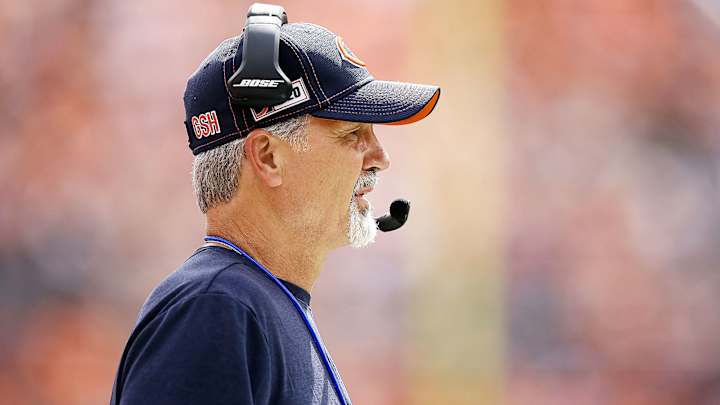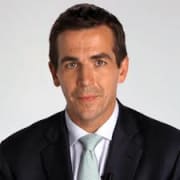The Lasting Impact of Chuck Pagano’s Battle With Cancer


On Christmas Eve 2012, Chuck Pagano was nervous before addressing his team. He was excited to hit the practice field. He was grateful for the many people who had stepped in while he was away. He was looking forward to returning to the meetings and the minutiae of being a football coach, things he’d never looked forward to before.
But the best moment of that Christmas Eve for the then-Colts coach didn’t come until the very end of that day, his first game back after being diagnosed with leukemia three months earlier. And it was meaningful not because of all he’d gone through, how his team responded, or any of that. It was meaningful because it simply signaled a return to normalcy after a cyclone of something else entirely.
The Colts left the light on in Pagano’s office for him. It stayed on for three months.
“And I can just remember once the day was over and we got done, walking out of there and shutting that light off,” Pagano said the week before Christmas. “And that was pretty huge moment. It was just kind of like, ‘OK, it's over.’ You were able to walk in there and actually turn that light off and ‘Yeah, you made it back.’ That was significant.”
Seven years later, Pagano knows today that while he is no longer actively receiving treatment for cancer, what he went through during that time will never leave him—and every Christmas Eve serves as a good reminder. Pagano has used his journey through cancer treatment to build bonds, raise money and help as many people as he can who are going through similar situations as the one he went through.
ChuckStrong has raised an after-expenses net of $7.428 million since launching in 2013, $6.096 million of which has come from his annual gala alone. And all that money has gone to support cancer research at the Indiana University Melvin and Bren Simon Cancer Center, where he was treated by Dr. Larry Cripe in 2012.
Cripe, in fact, was the one who sent Pagano a text that December that created the pivot point in his battle with leukemia—it was the text for which Pagano had been waiting. “Congrats,” it read. “CMR.”
CMR is an acronym for complete molecular remission, which is the stage the coach had to reach to return to work.
“That was like money,” Pagano says. “It was like, ‘Oh crap, we did it.’”
***
The 2012 Colts will always hold a different place in Pagano’s football journey. It’s because of the circumstances of that fall, of course, but it’s also about what that group showed him in his first year as an NFL head coach after 28 years as a college and pro assistant.
“Taking over a 2–14 team, blowing up the entire squad, rookie head coach, rookie quarterback, rookie GM, all new players, all those players from the past era were gone. Peyton [Manning], Gary Brackett, Dallas Clark—you can go on and on and on,” Pagano said. ”I mean, Reggie Wayne and Robert [Mathis] were not the only two, there were other guys, but [the team] was blown up. They had us ranked No. 32.”
Pagano spent the spring and summer, in tandem with GM Ryan Grigson, pushing that with the players—putting their power-rankings position on t-shirts and signs around the facility, as a way of manufacturing adversity.
When the real adversity hit, Pagano found out as much about his players as they did about him. The Colts were 1–2 and on a Week 4 bye when Pagano was diagnosed. The following week, the team was down 21–3 to the Packers at halftime in Week 5, but then-rookie QB Andrew Luck brought Indianapolis racing back to win 30-27, which set off a run of nine wins in 12 games in Pagano’s absence.
“We had a magical quarterback in Luck, you had like seven fourth quarter comebacks,” Pagano said. “But just to watch them keep playing and competing and gaining confidence through all the adversity and the circumstances, it just brought everybody so close. I mean, they were tough to beat. And they just knew that they could overcome anything.”
***
Pagano wasn’t completely out of the woods on that Christmas Eve 2012. He had to get three checkups a year for the first two years after he went into remission, and two checkups a year for the three years after that. He had to stay on the drug ATRA for two years. In 2017, five years after his diagnosis, he got what he calls now his “walking papers”—“If I want to go back just to hang out and get checked up, I can, but I don't have to anymore.”
Pagano’s biggest takeaways from those years are his relationships. There’s Cripe, his doctor, whose straight-forward approach sounds as if it was drawn up for a football coach. There’s Bruce Arians, to whom Pagano was already close but then bonded to forever after he stepped in as the Colts’ interim. And there are the kids who reached out when he was in the throes of treatment to offer encouragement.
The notes he got from little Ryan Darby remain burned in his memory. They warned Pagano that he’d feel tired and sick going through chemotherapy, and that he’d probably develop mouth sores. He advised that the coach have his wife Tina bring in cherry popsicles, as a substitute for when the doctors would advise he chew ice to manage the sores. Darby, now a teenage football player (he convinced his mom to let him play), still emails with Pagano.
Pagano also stays in touch with Mickey Deputy, who visited him in the owners suite when he was too sick to go down to the field. Deputy shaved her head in support of Pagano back then, and the two have stayed in contact since—Deputy’s mother brought her out to Bears training camp this summer.
And then there’s Cory Lane, another visitor to the box when Pagano was still receiving treatment. Pagano remembers meeting him with Grigson and Tom Telesco, then a Colts’ exec, and learning about Lane’s rare form of bone cancer—“He pulls himself out of that wheelchair and gives me a big hug around my neck, and he’s crying, and I’m crying, and he says, ‘Coach, I know you're going to beat this thing. You can do it.’”
Lane has since passed away, but his story remains important to Pagano. He was honored at ChuckStrong gala after his death.
“Those relationships are forever,” Pagano says. And inspired by these relationships, Pagano and his foundation developed a motto: NFA.
“Nobody fights alone,” Pagano says. “And once we got through it, the whole ChuckStrong gala thing, where that thing has come from and where it's at today, the people that we've been able to help encourage and get through their battles—not everybody wins—but along the way you're able to give back and help others. And that's the greatest thing. That's the greatest blessing in the whole thing.”
***
The Colts fired Pagano following the 2017 season, but the team still hosts the ChuckStrong gala most years at its facility. (The one year it wasn’t, the year Pagano was let go, was due to renovations. Indianapolis owner Jim Irsay, who has donated $2 million over the years to the cause, hosted it at his home instead.) This year, given Pagano’s new job as the Bears’ defensive coordinator, owner George McCaskey, GM Ryan Pace and coach Matt Nagy all attended to support Pagano.
“We all know there's a shelf life for these jobs,” Pagano said. “But that bond we [Irsay and Pagano] have? I mean, that's forever. And he's got a heart of gold. And we've already got a date for the eighth annual for next spring.”
This is why Pagano says cancer didn’t happen to him, it happened for him.
“It touches so many people,” he says. “You just never think it's going to be you. In the moment, you're like, ‘Why? Why me?’ And then once you come through it, you figure out why he puts you in the place he puts you, and why he brought you through. Now seven years later, the ChuckStrong gala, the movement and all the money that we've been able to raise, the people that we've been able to encourage and come to know through our cancer journey and help—that's the most gratifying thing in the world.
This brings us back to that day in Indianapolis seven years ago, when Pagano returned to coaching. In the team meeting that morning, he congratulated the group on getting to 10–5 and locking up a playoff spot, and thanked them for their support. And then it was on to that week’s game against Kansas City.
But deep down, Pagano knew he was a changed man. How could he not be?
“Dealing with expectations and dealing with pressure and all that stuff, when I’d start to go to those places that you don't want to go to, it just brought me back in a real hurry,” Pagano says. “It’s just to communicate with the guys that it's a privilege to coach and play in the National Football League, and we're playing and coaching a kid's game—don't forget that. Even though the pressure and the stakes are high, it's still a game.
“And there's some real-life stuff, where we can all learn from this experience and grow from this experience, and the next test that comes down our way, whether it's football or something with your family, real life stuff, because I always told them, there's going to be some stuff coming that is way, way bigger and stronger, way more adverse than a loss in the National Football League. So I think that helped us all.”
Pagano thinks that over the last seven years, his cancer diagnosis has made him a better coach. He knows it’s made him a better man.
Question or comment? Email us at talkback@themmqb.com.
